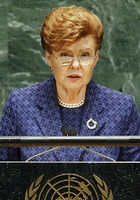 Tradition has it that the post of Secretary-General should rotate so that each geographical region gets its "turn." Women have never had a "turn" . . .
Tradition has it that the post of Secretary-General should rotate so that each geographical region gets its "turn." Women have never had a "turn" . . .
In her
post today,
Madame la Secrétaire générale?, Diane calls attention to
this article and welcomes additional nominations for the position of UN Secretary-General. When the SG post last came open, states were strongly urged to consider nominating women (
see, e.g., this action item from 2005, suggesting many accomplished women for the post). Only one female candidate emerged,
Vaira Vike-Freiberga (
photo), then President of Latvia, who ran at the joint invitation of Latvia, Estonia and Lithuania. In her statement announcing her candidacy she said:
 With my formal decision to run for the post of UN Secretary General I wish to encourage women all over the world to continue their efforts to challenge prejudices and stereotypes. Half of humankind has never been represented at the helm of the UN. It is time to change this practice, which fails to reflect the structure of the world population. At the same time I wish to emphasize that the world cannot be divided into female and male, and we all must join together to defend human values and make the world a better place.
With my formal decision to run for the post of UN Secretary General I wish to encourage women all over the world to continue their efforts to challenge prejudices and stereotypes. Half of humankind has never been represented at the helm of the UN. It is time to change this practice, which fails to reflect the structure of the world population. At the same time I wish to emphasize that the world cannot be divided into female and male, and we all must join together to defend human values and make the world a better place.
In a
straw vote in the Security Council, Vike-Freiberga placed third among the six candidates, with two opposing votes from permanent members of the Council, no doubt Russia and China. Relations between Russia and Latvia were tense, and China was insistent th

at it was Asia's "turn" for the post of Secretary-General, a position strongly supported by Russia and many other UN member states. Until Ban Ki-moon's appointment in 2006, only one Asian had served as UN Secretary-General,
U Thant of Burma (left), who served from 1961 to 1971. A number of Asian women were among those listed

as potential candidates for the post of Secretary-General, including Singapore's ambassador to the US,
Chan Heng Chee (right). Some of them supported other candidates, but most simply did not have the support of their governments to run for the post, a key factor in this highly political process.
Tradition has it that the post of Secretary-General should rotate so that each geographical region gets its "turn." Women have never had a "turn" . . .
With my formal decision to run for the post of UN Secretary General I wish to encourage women all over the world to continue their efforts to challenge prejudices and stereotypes. Half of humankind has never been represented at the helm of the UN. It is time to change this practice, which fails to reflect the structure of the world population. At the same time I wish to emphasize that the world cannot be divided into female and male, and we all must join together to defend human values and make the world a better place.
 at it was Asia's "turn" for the post of Secretary-General, a position strongly supported by Russia and many other UN member states. Until Ban Ki-moon's appointment in 2006, only one Asian had served as UN Secretary-General, U Thant of Burma (left), who served from 1961 to 1971. A number of Asian women were among those listed
at it was Asia's "turn" for the post of Secretary-General, a position strongly supported by Russia and many other UN member states. Until Ban Ki-moon's appointment in 2006, only one Asian had served as UN Secretary-General, U Thant of Burma (left), who served from 1961 to 1971. A number of Asian women were among those listed  as potential candidates for the post of Secretary-General, including Singapore's ambassador to the US, Chan Heng Chee (right). Some of them supported other candidates, but most simply did not have the support of their governments to run for the post, a key factor in this highly political process.
as potential candidates for the post of Secretary-General, including Singapore's ambassador to the US, Chan Heng Chee (right). Some of them supported other candidates, but most simply did not have the support of their governments to run for the post, a key factor in this highly political process.


